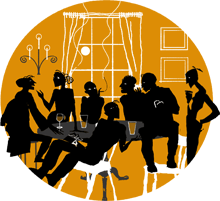Wed, May 22 2024 01:19
| Permalink
Creating dangerously or the art of conformity?
Saturday 15th June, 1.00 pm - 3.00 pm
Map Room, Cherry Reds, 88-92 John Bright Street, B1 1BN
Tickets £3.50 (plus EventBrite fee)
Please book via EventBrite
"The work of the artist in all its aspects is, of its nature, individual and free, undisciplined, unregimented, uncontrolled. The artist walks where the breath of spirit blows him. He cannot be told his direction; he doesn’t know it himself”. John Maynard Keynes, writing as chairman of the Arts Council in 1943
In the Second World War, Birmingham Surrealist painter Conroy Maddox had his works seized by Scotland Yard in a raid, as they were suspected to contain messages to the enemy. Perhaps Maddox was an example in action of the exhortation of writer Albert Camus in his 1957 lecture to create dangerously. On the other hand, he might have not been subject to a police raid in a different historical time, and he was more like Keynes’ description of an artist, not really knowing his direction.
Earlier this year, artists were outraged about changes made to the Arts Council’s guidance suggesting artists and art institutions should be careful not to damage the Arts Council’s reputation through “activity that might be considered overtly political and activist”. The argument advanced was that art should be political.
Arguably though, being political is what is most valued in art now and in rather predictable ways. The 2023 Turner Prize winner Jesse Darling's work is about Brexit, labour, class, and power. On the 2023 Turner Prize shortlist was Barbara Walker for her portraits of Black British people affected by the Windrush scandal. The work of the Turner Prize winner in 2022, Veronica Ryan, also referenced the Windrush scandal. When the Turner Prize was awarded in 2023, Jesse Darling pulled out a Palestinian flag. At this year’s Venice Biennale, the Israeli artists refused to open the Israel Pavilion in protest at the Israel/Gaza war. Of course, these are all serious issues worthy of debate, interrogation, and artistic representation. But if these artists were advancing very controversial ideas, or were producing art that was not well understood, would they be in receipt of top art prizes or invited to world renowned exhibitions? Are they really being politically challenging or complying with establishment ideological orthodoxy?
As Camus observed, “The question, for all those who cannot live without art and what it signifies, is merely to find out how, among the police forces of so many ideologies (how many churches, what solitude!), the strange liberty of creation is possible.” Whether actual or ideological policing of the arts is taking place, there is an impact on the freedom of the artists and their creativity.
In the autumn of 2023, dancer and choreographer Rosie Kay and ex-Arts Council employee Denise Fahmy set up an organisation, Freedom in the Arts, out of concern for the narrowing realm of artistic freedom. Its manifesto states: “Artists face a stifling environment of censure and intimidation. Many people working in the arts are afraid to express everyday views. Freedom in the Arts responds to this crisis in the cultural sector.”
We’re very pleased to welcome Denise to Birmingham Salon to discuss the Freedom in the Arts project and its ambition to make the arts a place for the exploration of difficult ideas.
We’re very pleased to welcome Denise to Birmingham Salon to discuss the Freedom in the Arts project and its ambition to make the arts a place for the exploration of difficult ideas.
Speaker
Denise Fahmy - Denise has 30 years’ experience in arts management and is a museums and visual arts specialist. For 15 years she managed a portfolio of over £2million pa at Arts Council England until, in 2023, she resigned and won an Employment Tribunal against ACE after her colleagues harassed her due to her beliefs. Denise's tribunal win was the first case to test the historic Forstater Judgement.
Chair Rosie Cuckston
Reading
Freedom in the Arts Manifesto, Denise Fahmy/Rosie Kay
Artistic freedom is worth the risk, Denise Fahmy, The Critic, February 2024
Letter on Liberty - Art against orthodoxy, JJ Charlesworth, Academy of Ideas, February 2021
Meet the modern day censors, wielding their purse strings over artists and their work, Sonia Sodha, The Guardian, February 2024
Freedom in the Arts Manifesto, Denise Fahmy/Rosie Kay
Artistic freedom is worth the risk, Denise Fahmy, The Critic, February 2024
Letter on Liberty - Art against orthodoxy, JJ Charlesworth, Academy of Ideas, February 2021
Meet the modern day censors, wielding their purse strings over artists and their work, Sonia Sodha, The Guardian, February 2024
Comments
